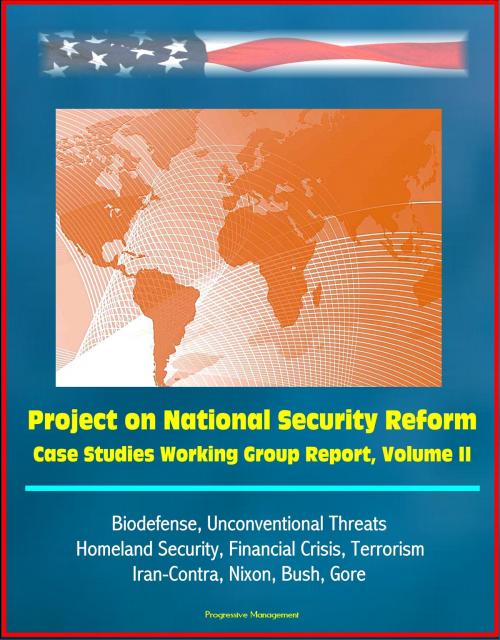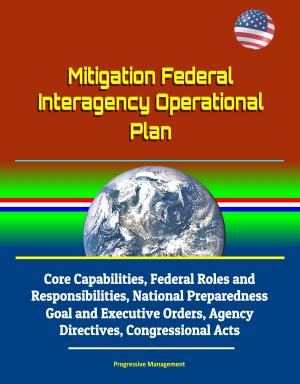Project on National Security Reform: Case Studies Working Group Report, Volume II - Biodefense, Unconventional Threats, Homeland Security, Financial Crisis, Terrorism, Iran-Contra, Nixon, Bush, Gore
Nonfiction, Social & Cultural Studies, Political Science| Author: | Progressive Management | ISBN: | 9781301976362 |
| Publisher: | Progressive Management | Publication: | March 13, 2013 |
| Imprint: | Smashwords Edition | Language: | English |
| Author: | Progressive Management |
| ISBN: | 9781301976362 |
| Publisher: | Progressive Management |
| Publication: | March 13, 2013 |
| Imprint: | Smashwords Edition |
| Language: | English |
The studies featured in this case study volume span from the Eisenhower administration to the present day, offering diverse lessons and covering a range of issues from public diplomacy, to nonproliferation, to biodefense, to peacekeeping and alliance management, among others. Investigations of the Iran-Contra Affair and the American response to the Rwanda genocide provide valuable analysis of infamous national security system breakdowns, while assessments of more successful responses, such as the U.S. intervention in East Timor, offer more positive and equally informative lessons. Overall, the body of case literature confirms that the reactive decisionmaking, sequential leveraging of tools of national power, and inefficient resourcing which are regular products of the current system consistently fail to support U.S. security.
Subjects covered include Franklin Delano Roosevelt, Richard Nixon, Spiro Agnew, Al Gore, George H.W. Bush, Strobe Talbott, East Timor, and more.
CONTENTS * Foreword * Summary * Introduction * Part I: Organizing the National Security Apparatus * Chapter 1 * The Vice President and Foreign Policy: From "The Most Insignificant Office" to Gore as Russian Czar * Chapter 2 * The Iran-Contra Affair * Part II: Mitigating and Managing Unconventional Threats * Chapter 3 * Progress of "Biodefense Strategy for the 21st Century": - A Five-Year Evaluation * Chapter 4 * Failures at the Nexus of Health and Homeland Security: The 2007 Andrew Speaker Case * Chapter 5 * Counterterror Failure: The Fadlallah Assassination Attempt * Part III: Dealing with the New World Disorder. * Chapter 6 * The Asian Financial Crisis: Managing Complex Threats to Global Economic Stability * Chapter 7 * The Banality of the Interagency: U.S. Inaction in the Rwanda Genocide * Chapter 8 * The Crisis in U.S. Public Diplomacy: The Demise of the U.S. Information Agency * Part IV: Leveraging and Supporting Allies * Chapter 9 * U.S. Interagency Efforts to Combat International Terrorism Through Foreign Capacity Building Programs * Chapter 10 * U.S. Decisionmaking Regarding East Timor, 1999 * Chapter 11 * The Interagency, Eisenhower, and the House of Saud * Chapter 12 * Conclusion * Appendix: Volume II Case Study * Summaries
The studies featured in this case study volume span from the Eisenhower administration to the present day, offering diverse lessons and covering a range of issues from public diplomacy, to nonproliferation, to biodefense, to peacekeeping and alliance management, among others. Investigations of the Iran-Contra Affair and the American response to the Rwanda genocide provide valuable analysis of infamous national security system breakdowns, while assessments of more successful responses, such as the U.S. intervention in East Timor, offer more positive and equally informative lessons. Overall, the body of case literature confirms that the reactive decisionmaking, sequential leveraging of tools of national power, and inefficient resourcing which are regular products of the current system consistently fail to support U.S. security.
Subjects covered include Franklin Delano Roosevelt, Richard Nixon, Spiro Agnew, Al Gore, George H.W. Bush, Strobe Talbott, East Timor, and more.
CONTENTS * Foreword * Summary * Introduction * Part I: Organizing the National Security Apparatus * Chapter 1 * The Vice President and Foreign Policy: From "The Most Insignificant Office" to Gore as Russian Czar * Chapter 2 * The Iran-Contra Affair * Part II: Mitigating and Managing Unconventional Threats * Chapter 3 * Progress of "Biodefense Strategy for the 21st Century": - A Five-Year Evaluation * Chapter 4 * Failures at the Nexus of Health and Homeland Security: The 2007 Andrew Speaker Case * Chapter 5 * Counterterror Failure: The Fadlallah Assassination Attempt * Part III: Dealing with the New World Disorder. * Chapter 6 * The Asian Financial Crisis: Managing Complex Threats to Global Economic Stability * Chapter 7 * The Banality of the Interagency: U.S. Inaction in the Rwanda Genocide * Chapter 8 * The Crisis in U.S. Public Diplomacy: The Demise of the U.S. Information Agency * Part IV: Leveraging and Supporting Allies * Chapter 9 * U.S. Interagency Efforts to Combat International Terrorism Through Foreign Capacity Building Programs * Chapter 10 * U.S. Decisionmaking Regarding East Timor, 1999 * Chapter 11 * The Interagency, Eisenhower, and the House of Saud * Chapter 12 * Conclusion * Appendix: Volume II Case Study * Summaries















